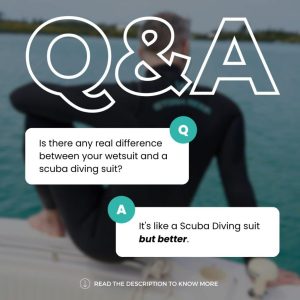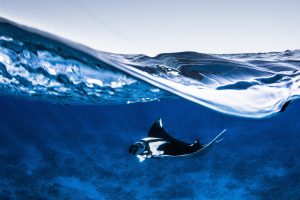Despite being landlocked, Colorado is one of the top three states for the most certified scuba divers per capita, according to the Professional Association of Diving Instructors.
The top two states, Florida and California, make a bit more sense. But John Sherman, co-founder and executive director of Denver Adaptive Divers (DAD), doesn’t think Colorado’s statistical heights are that much of a shock.
“The nature of Colorado is so athletic to begin with,” Sherman said, sitting in his family-owned diving store, Denver Divers, which has been bringing scuba gear and lessons to the city since 1960.
Sherman — along with around 20 instructors and 40 “diving buddies” — decided to help share that diving joy that so many Coloradans love with those with physical disabilities, creating the Denver Adaptive Divers nonprofit.
DAD looks to give those with physical disabilities a chance to experience the weightlessness of water, working directly with Craig Hospital in Englewood to find patients interested in the activity.
“Somebody that’s in a chair, they negotiate everything today. ‘There’s a curb, I’ve got to negotiate that. There’s stairs. Where’s an elevator?’ Everything in their life,” Sherman said during a trial session for a Craig Hospital patient on Friday. “Their life is consisting in that chair. When you take them to the ocean and take them down, they aren’t coming in the chair.”
Sherman notes that the process of teaching someone with a physical disability to dive depends on the patient.
For example, Sherman spoke of a man with two amputated arms above the elbows. Though the man could swim well, he could not control the buoyancy compensator on his suit.
The DAD team met with the man’s prosthetist and created a prosthetic that was put over his left arm and had gave him the ability to press the deflate button on his own and a flip hood so he could orally inflate his suit on the surface.
“We call it adaptive because it’s not them adapting to us, it’s the reverse,” Sherman said. “We’re going to adapt to them and figure out what makes it work for them to create as much independence as possible.”

Ray Brienza, left, and John Grubbs, right, assist Isabella Syvertson out of the pool at Denver Divers in Cherry Creek after a scuba session on Friday, Feb. 23, 2024. “It was really nice not having to depend on anyone to help me walk,” Syvertson said.
He added that those interested can obtain a scholarship to eventually become certified. DAD will also give a scholarship to a family member, if necessary, so the diver will always have someone to help them.
The team is certifying 14 new adaptive divers on a trip to the Cayman Islands in June, Sherman said, pointing out that they always work to find places to travel and dive that are compliant to the needs of the divers.
The nonprofit was recently awarded approximately $25,000 as part of the Christopher & Dana Reeve Foundation National Paralysis Resource Center (NPRC) 2023 Direct Effect 2nd Cycle Quality of Life grants.
Sherman noted that the money will go to new diving equipment so that adaptive divers don’t have to rent gear in the future.
The benefit

Isabella Syvertson is a patient at Craig Hospital, who participated the Denver Adaptive Diver’s monthly dive with the hospital’s patients on Friday, Feb. 23, 2024.
Isabella Syvertson, a 23-year-old woman from Lake Park, Minnesota, left the diving pool with a seemingly permanent smile.
“I really like how quiet it is in the water,” she said of her first diving experience. “If it was that much fun in the pool, I can’t imagine how much fun it’s going to be to actually be out in the ocean.”
She described the diving experience as a feeling of independence, something she hasn’t truly felt since being bucked off of a horse in November, bursting her T6 vertebrae and placing her in a wheelchair.
Through the last few months at Craig Hospital, Syvertson has begun to gain feeling back in her toes and feet. She has learned to walk with leg braces and a cane.
In the pool, she didn’t need any assistance moving. No chair, no cane, no problem.
“It was really nice not having to depend on anyone to help me walk,” she said. “When I was in the pool it was kind of like, just being independent and free and not having to worry about ‘am I going to roll my ankle?’”
“Once they understand neutral buoyancy, it’s like floating in space,” Sherman said. “All of a sudden, they were restricted on what they could do movement-wise and now they’re not.”
Sherman and Kristi Smith, a recreational therapist at Craig Hospital, both stated that independence of movement was the biggest positive that those with physical disabilities enjoy while diving.
They also added that diving can help with nerve pain, spasticity and migraines for those with brain injuries.
Syvertson agreed, adding that she didn’t feel nerve pain in the water and didn’t have to worry about things like shooting pain if she stepped on a certain surface.
The benefits and smiles, like Syvertson’s, are what keep DAD and their collection of certified volunteers going.
It’s also what keep Craig Hospital patients coming back.
“The biggest feedback that I’ve received after watching them try scuba is they say they felt like they didn’t have a disability anymore,” Smith said. “So, they just wanted to get back in the water because they didn’t want to get back in their chair and be reminded of all the hard tasks they have to do throughout the day.”


